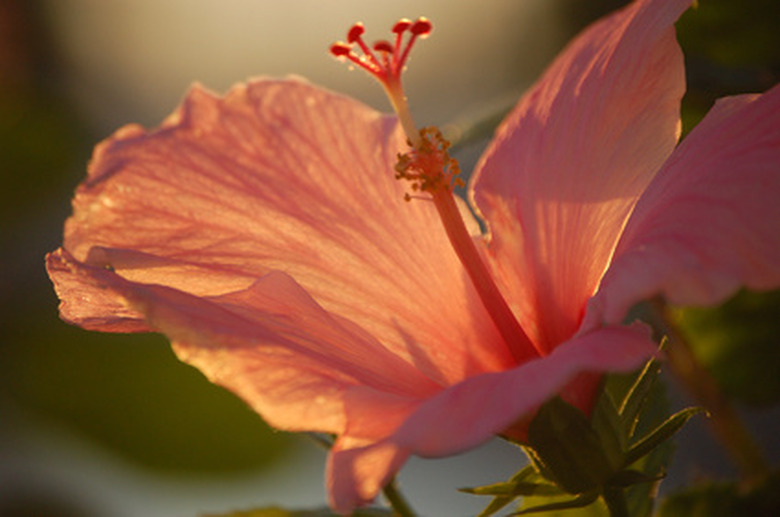Small Black Bugs On A Hibiscus Plant
Hibiscus plants are susceptible to a small black bug pest that may cause extensive cosmetic damage to your flowers while creating a prime environment for subsequent disease. Familiarize yourself with these pests as well as what to look for and how to respond should an infestation occur in your home garden.
Care
Vigorous hibiscus plants have a greater capacity for resisting and fighting off pest infestations when compared to weakened or injured plants. Grow your hibiscus in locations that offer full, direct sun for at least half of a day, according to the University of Florida IFAS Extension. Hibiscus plants prefer moist, well-drained soil with a pH of 5.5 to 6.5. Research your particular hibiscus variety for detailed needs in order to keep your plant vigorous.
Identification
Aphids are small black bugs that also appear in green, yellow, blue, white, brown or pink. On hibiscus plants, these black bugs measure up to 1/8 inch in length and have bodies resembling the shape of a pear, according to the University of Florida IFAS Extension. Look for these pests beneath leaf surfaces, where they appear most prevalently during the spring.
- Hibiscus plants are susceptible to a small black bug pest that may cause extensive cosmetic damage to your flowers while creating a prime environment for subsequent disease.
- Vigorous hibiscus plants have a greater capacity for resisting and fighting off pest infestations when compared to weakened or injured plants.
Effects
Aphids are sucking bugs that insert their mouths into soft, usually new growth of plant tissue from which they suck the fluids, or sap, from the plant. As they feed, aphids produce honeydew, a sugary substance that creates the perfect environment for the germination of a fungal infection called sooty mold. Sooty mold is a secondary problem that indicates an aphid infestation. The presence of these small black bugs results in curled leaves, malformed flowers and buds and stunted growth, according to the University of Florida IFAS Extension.
Natural Control
For natural control of aphids on hibiscus plants, consider the release of natural enemies in your home garden. Natural enemies are predatory insects that hunt and kill aphids without causing further damage to your plants. Bugs like lady beetles and aphid lions are appropriate for this infestation, according to the University of Florida IFAS Extension. Find predatory insects in garden supply stores or catalogs. Additionally, spray your plants with a strong stream of water to knock aphids off.
- Aphids are sucking bugs that insert their mouths into soft, usually new growth of plant tissue from which they suck the fluids, or sap, from the plant.
- For natural control of aphids on hibiscus plants, consider the release of natural enemies in your home garden.
Chemical Control
Chemical control is an effective management method for aphid infestations. If you notice damage on your plants, spray an insecticide until it drips from your hibiscus. Choose a chemical with the active ingredient befenthrin or carbaryl. For a botanical insecticide option that is gentler on plants as well as humans, use a neem oil product, according to the University of Florida IFAS Extension. When in need of assistance, contact a licensed professional or your local county extension agent.
